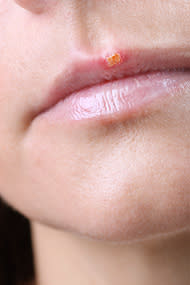 Shine On
Shine OnCold sores: facts and fiction

Winter may be well behind us, but that doesn't mean the end of cold sore season. For many Canadians, cold sores are a reality year round — and are especially unpleasant during summer's busy socializing season when proms, weddings and backyard get-togethers pack people's calendars.
Experts have found that one-third of Canadians are affected by multiple cold sores each year, with the average outbreak lasting from 6-10 days.
According to a recent survey conducted by Harris/Decima, Albertans have the highest incidence of cold sore outbreaks, followed by British Columbians and Atlantic Canadians. The study, commissioned by Abreva, also found that Canadians would give up dessert, shopping, and even smartphones for one month to be cold sore-free. Dessert topped the list (35%), followed by shopping (21%) and smartphones (17%).
What triggers a cold sore can vary from person to person, but common ones include stress, a cold or flu, sun exposure, hormone changes, wind, extreme cold temperature or very dry lips. Cold sores are caused by the herpes simplex 1 virus and as such, anything that weakens your immune system can cause an outbreak of these unsightly and often painful blisters, either single or in clusters.
Because the virus is highly contagious during an outbreak, it's important to follow good personal hygiene habits if you're experiencing an outbreak, including proper hand washing.
"They're contagious from the moment people can feel the cold sore right up into through the blister stage, and then right up until it's gone and you can't see it anymore," explains pharmacist Nancy Simonot.
[See also: What celebrities really look like up close]
"The virus is spread through lip-to-lip contact or through saliva. So you want to watch if you're sharing a glass or utensils. You want to make sure they're washed well."
When it comes to treating cold sores, there are a lot of myths out there as to what does and doesn't work.
"The most common ones that I see are applying a tea bag," says Simonot. "The second one is distilled vinegar; applying ice. I've even heard of rubbing in aspirin."
Simonot explains that roughly one-third of Canadians believe these myths will treat a cold sore faster, but there's no evidence that shows that the cold sore's duration will be shortened at all.
Since cold sore outbreaks are in large part due to a weakened immune system, taking care of your health is the best way to prevent an outbreak. Things like getting a good night's sleep, exercising regularly and eating a balanced diet are the first step in helping fend off the virus.
If you know what your triggers are, step two is to avoid them as much as possible. This could mean managing stress, using sun protection and lips balms to keep the lip area moist.
Some factors are out of our control and when all else fails and you experience an outbreak, medicated treatments can help speed the healing time of any blisters that pop up.
"A lot of my patients have told me that if they catch it when it's in that first stage, when they just feel a tingling or an itch oftentimes you can prevent it from turning into that big blistery cold sore," says Simonot, adding that there are a lot of really great treatments on the market right now.
Speak to your doctor to find out what treatment is best for you.
More from Shine on Yahoo! Canada
Are you addicted to makeup?
Fashion trends we hope won't catch on
Top requested celeb haircuts


